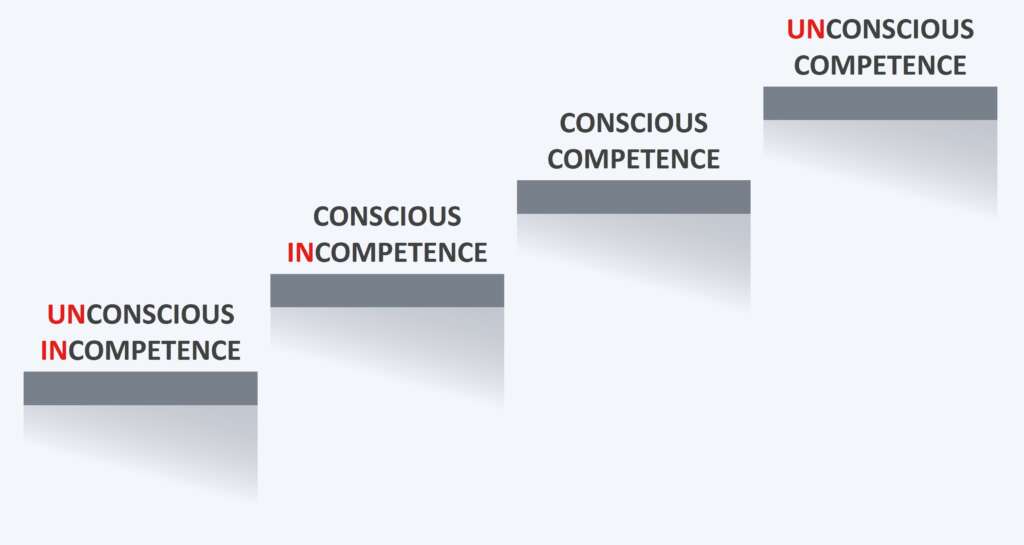
Blog
Finding motivation in unprecedented times, for you, your team and your stakeholders
By Alison Smith |
You may have noticed a change in your level of motivation at the moment – whether up or down.
You may also have noticed a change in the motivation of your family, friends, colleagues and stakeholders.
What worked only a few weeks ago is no longer working – and that’s not just about what motivates us.
The world has radically changed and every aspect of our personal and working lives continues to change daily.
As much as we’d like, we can’t go back to how things were, and instead we need to have awareness of where things are now and where they are headed.
I think there’s a few things going on that will help explain our reactions, and those of our stakeholders.
The two models I’d like to focus on here are attributed to Broadwell, and McClelland.
Broadwell suggested that all tasks are either being undertaken unconsciously or consciously, and we’re either competently or incompetently undertaking them.

- For example, if you think about the process you went through to learn to drive a car:
- Initially, we didn’t know what we didn’t know and were unconsciously incompetent
- Then we got in the driving seat and discovered how much there was to learn and moved into conscious incompetence
- As we learnt to drive and increased our ability we still needed to pay attention but had moved to conscious competence
And now we’re in unconscious competence we can drive for a few hours and not even know how we’ve got here
Over time of course we can move back down the levels, for example:
- When teaching someone we have to move back into conscious competence to share how to do what we do
- Although Over time, we can start to cut corners and be operating in unconscious incompetence about some of our driving – only to move into conscious incompetence when attending advanced driving lessons, or the speed awareness course!
The truth of the matter is what took up a lot of conscious awareness when we were learning isn’t even registered now as it’s accomplished competently in the background as an unconscious habit.
And therein lies the challenge at the moment – unconscious habits that we’ve developed our competence in over years have been thrown up in the air.
Our mind’s limited bandwidth
All the daily habits such as how we live as a family, how we shop, how we go for a walk, interact with others, measure two meters, and even wash our hands have been pushed out of our unconscious and into our conscious awareness.
For example, a colleague who had previously managed to do a shop and speak with a team member on their phone needed every ounce of their attention to do the supermarket shopping at the weekend. They were having to learn to do it all over again but with new skills of social distancing, hand washing, not touching their face and worrying about who had touched the tinned items on the shelves earlier, all taking up a lot of bandwidth of their limited conscious mind.
This bandwidth is related to cognitive psychologist George Miller’s magic number of 7 +/-2 stimulus that we can manage at any moment in time.
Is it any wonder then that we’re struggling to be motivated about additional work? What was background noise is now jamming the signal and using up all available headspace, energy and every last ounce of motivation.
This suggests one strategy which is not to add so many things to the to-do list.
Pare your to-do list back to the key things to do – the essentials if you will. The niceties can wait – whether they’re in your objectives or not.
McClelland’s model comes into its own when we look at the language of motivation. It suggests that what we are each motivated by will fall into one of three areas:
- Achievement
- Affiliation
- Influence
This means for example that category management might be sold differently depending on which of these is of most importance to someone ie:
- Achievement – category management ensures you achieve your objectives and get results
- Affiliation – category management helps you to work together with the business
- Influence – category management provides you with control over your spend
There is, however, an additional aspect to the McClelland model that I think is key at the moment.
‘Towards’ or ‘away from’
McClelland suggests people are either motivated ‘towards’ what they want, or ‘away from’ what they don’t want. With the above statements very much focusing towards what they will get as a result of undertaking category management.
This means the sales pitches we use would sound very different if we’re telling people what they will be moving away from rather than towards. For example:
- Achievement – category management ensures you avoid missing supply chain risks and failing to meet your objectives
- Affiliation – category management ensures we don’t work alone or in silos and therefore reduces conflict.
- Influence – category management avoids you being told what to do by others and having no control over your spend.
In education workshops and coaching sessions, it’s very clear that the majority of procurement professionals prefer to use ‘towards’ language as they want to present future potential benefits. However, for some key stakeholders, and certainly for many others at this time of great upheaval and change, I think stakeholders are more motivated by moving ‘away from’ risks, problems, complaints and other areas of stress.
This is perhaps linked to Maslow’s hierarchy of needs, and Kubler-Ross’s change curve that means we, our teams and many of our stakeholders are more interested in what is going to be removed, taken away, or stopped NOW rather than hearing about the long-term vision of some unknown future.
This means many of us, our stakeholders included, are wanting to avoid unnecessary, non-essential or complex discussions or decisions. We want to be helped to avoid supply disruption, and non-compliance, helped to avoid and mitigate risks, and have conflict minimised. In other words, all things that will make life feel safer and grounded NOW.
Just at the moment, whilst much of their lives are in lock-down, what many people don’t want to hear about is long-term savings targets, future projects or discussions about 2021.
In summary, if you, your team or your stakeholders are lacking motivation, my recommendations are:
- Review and reprioritise to-do lists taking out any niceties – i.e. release some bandwidth
- Postpone talking about the long-term goals – anyone lacking motivation can’t understand how they’re relevant
- Introduce ‘away from’ language and focus on how to make their lives better for today, this week or next week (actually, walking the talk, I really mean focus on how to make their lives less stressful today) because that’s what will enable them to do the job you want/need them to do
Once life has settled down and we’ve all got a little more headspace and clarity about our personal and organisational medium-term position then we can get back to stretching goals and adding loads more value to organisations. After all, they’re going to need even more of what we have to offer than they ever have before.
Look after yourselves and stay safe.
Further reading
Blog post: Procurement isn’t just about the process it’s about the people too

About Alison Smith
Principal Consultant
After 15 years in Procurement in organisations, Alison decided that she wanted to expand that pattern observation, exploration, and problem-solving to help others solve their problems in life and to help them get back on track. Combining her unique experience as a procurement expert and a coach she offers a refreshing approach to personal development for Procurement Professionals.




